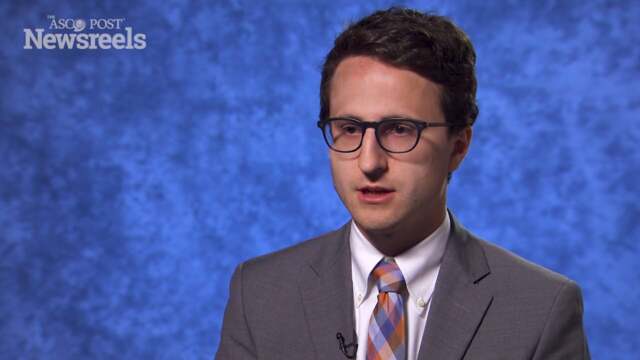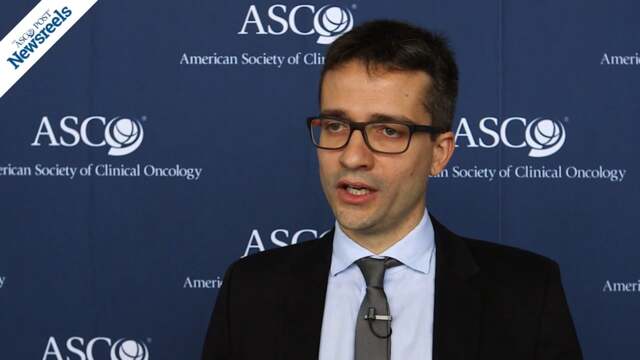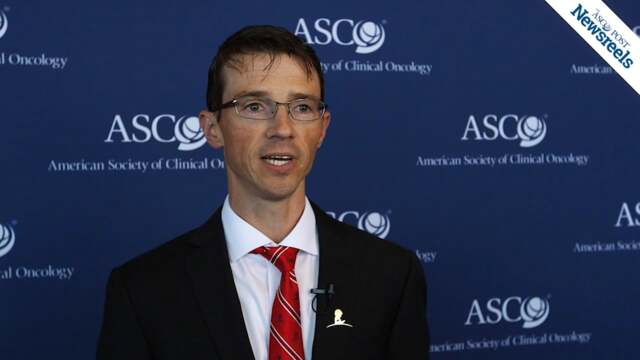2018 SURVIVORSHIP: Exercising During Chemotherapy for Breast or Colon Cancer Has Long-Term Benefits
A follow-up study to a randomized clinical trial reveals that exercising during adjuvant chemotherapy helps people engage in more physical activity years later. Four years later, people with breast or colon cancer who had participated in an 18-week exercise program while receiving chemotherapy...
2018 SURVIVORSHIP: Web-Based Interventions Help Adolescents Stay Physically Active After Cancer Treatment
Survivors of childhood cancer are at increased risk for obesity and metabolic syndrome, which can lead to other serious health conditions, including heart disease, stroke, and diabetes. However, engaging in regular physical activity may help remediate these health issues in young survivors. A...
Effects of Group Psychosocial Intervention on Body Image and Quality of Life in Breast Cancer Survivors
In a study reported in the Journal of Clinical Oncology, Esplen et al found that a group psychosocial intervention was effective in improving body image concerns and breast cancer–related quality of life among breast cancer survivors. Study Details In the study, 194 breast cancer survivors...
Cancer Statistics, 2018: U.S. Cancer Mortality Continues Decades-Long Drop
THE CANCER death rate dropped 1.7% from 2014 to 2015, continuing a drop that began in 1991 and has reached 26%, resulting in nearly 2.4 million fewer cancer deaths during that time. The data are reported in “Cancer Statistics, 2018,” the American Cancer Society’s comprehensive annual report on...
Preserving Sexual Function in Women Treated for Cancer
“There is huge potential to positively influence a patient’s experience and outcomes” by addressing concerns about sexual function after cancer treatment early in the course of treatment planning, Stacy Tessler Lindau, MD, MA, stated in her keynote address at the 11th Annual Oncofertility...
Fiber Is Only One Component in Improving Outcomes in Cancer Survivors
SINCE 2003, every iteration of the American Cancer Society’s Nutrition Guidelines for Cancer Survivors has advocated for a plant-based diet with ample quantities of whole grains, as well as vegetables and fruits.1-3 This recommendation has been based primarily on data that such foods play in...
Prevalence of Prior Cancer in Patients With Newly Diagnosed Cancer
In a study using Surveillance, Epidemiology, and End Results (SEER) data reported in JAMA Oncology, Murphy et al found that among persons newly diagnosed with cancer, 25% of those aged ≥ 65 years and 11% of those aged < 65 years had a history of a prior primary cancer. Prevalence of Prior...
Many Cancer Survivors Live With Post-Traumatic Stress Disorder
A recent study showed approximately one-fifth of patients with cancer experienced post-traumatic stress disorder (PTSD) several months after diagnosis, and many of these patients continued to live with PTSD years later. Published by Chan et al in Cancer, the findings highlight the need for early...
Are Thyroid Cancer Survivors at Increased Risk for Aging-Related Diseases?
A study by Blackburn et al investigating the risks of aging-related diseases such as heart disease and diabetes among thyroid cancer survivors has found that although younger and older survivors had an increased risk for these diseases, those younger than age 40 had a higher risk for hypertension,...
Predictive Model for Ischemic Heart Disease and Stroke in Childhood Cancer Survivors
As reported in the Journal of Clinical Oncology, Chow et al have developed a model that distinguishes risk groups for ischemic heart disease and stroke in 5-year survivors of childhood cancer. Study Details The study included data from 13,060 participants in the Childhood Cancer Survivor Study...
Novel Psychosocial Intervention for Fear of Cancer Recurrence
An Australian trial has shown that a novel theoretically/empirically based intervention (ConquerFear) reduced the fear of cancer recurrence compared with relaxation therapy among patients treated for curable cancers. These results were reported by Butow et al in the Journal of Clinical Oncology....
Life After Treatment: Managing Lymphoma Survivors
According to Surveillance, Epidemiology, and End Results (SEER) data, patients with Hodgkin lymphoma and non-Hodgkin lymphoma (NHL) have 5-year survival rates of 86% and 71%, respectively.1 Although the increased number of survivors is welcome proof of the success of new treatment regimens, it also ...
New Persistent Opioid Use After Curative-Intent Cancer Surgery
A study reported by Lee et al in the Journal of Clinical Oncology indicates that approximately 10% of patients undergoing curative-intent surgery for cancer become new persistent opioid users. Study Details The study involved data from 68,463 patients from a national data set of insurance claims...
Long-Term Survivors of Childhood Cancer Prone to ‘Job Lock’ due to Worries About Losing Health Insurance
The results of a national cancer survey reveal a significant number of childhood cancer survivors are worried about keeping their health insurance, to the point of letting it affect their career decisions. The findings were published by Kirchhoff et al in JAMA Oncology. Anne Kirchhoff, PhD,...
Predicting Risk of Subsequent CNS Tumors in Survivors of Childhood Cancer
As reported in the Journal of Clinical Oncology, Wang et al have developed a model for predicting risk of subsequent central nervous system (CNS) tumors in survivors of childhood cancer. Study Details In the study, matched childhood cancer survivors with (n = 82) and without (n = 228) subsequent...
Cumulative Burden of Chronic Health Conditions in Childhood Cancer Survivors
In a report from the St Jude Lifetime Cohort Study published in The Lancet, Bhakta et al detailed the burden of lifetime chronic health conditions in survivors of childhood cancers. The report included retrospectively collected data on chronic health conditions in 5,522 patients treated for...
James E. Bates, MD, on Pediatric Cancer Survivors: New Findings on Late Effects
James E. Bates, MD, of the University of Florida, discusses a volumetric dose-effect analysis of late cardiotoxicity, results from the Childhood Cancer Survivor Study (Abstract 4).
News From JCO and JOP
STAYING UP-TO-DATE in the fast-paced world of oncology literature is a daunting task at best. To assist with that task, The ASCO Post has assembled an assortment of studies recently published in the Journal of Clinical Oncology (JCO) and the Journal of Oncology Practice (JOP). Future installments...
ESMO 2017: NOR-CAYACS Trial: Factors That May Limit Work Ability of Young Adult Cancer Survivors
Factors that may limit the ability of young adult cancer survivors to work were reported at the European Society for Medical Oncology (ESMO) 2017 Congress in Madrid (Abstract 1110PD_PR). Late side effects can occur months or years after cancer treatment. In patients diagnosed with cancer in young...
Financial Burden Among Survivors of Childhood Cancer
Findings from the Childhood Cancer Survivor Study, reported in the Journal of Clinical Oncology by Nipp et al, indicate that childhood cancer survivors are more likely than unaffected siblings to spend a higher percentage of income on out-of-pocket medical costs, potentially leading to reduced use...
Bridging the Survivorship Care Gap for Young Adult Survivors of Thyroid Cancer
Although thyroid cancer is among the five most common carcinomas diagnosed in adolescents and young adults (AYAs) between the ages of 15 and 39—thyroid cancer is more common in young women than young men and is the most common cancer diagnosed in females between the ages of 15 and 29 and the second ...
HPV Vaccination Rates Especially Low Among Childhood Cancer Survivors
The rate of human papillomavirus (HPV) vaccination in the United States is increasing, but remains lower than ideal. A new study suggests that survivors of childhood cancer receive the HPV vaccine at an even lower rate than their peers without cancer—24% vs 40%, respectively. Nearly...
Higher Opioid Use Among Cancer Survivors
A new study found that opioid prescription use is more common in cancer survivors than in individuals without a history of cancer. This was true even among survivors who were 10 or more years past their cancer diagnosis. Published by Sutradhar et al in Cancer, the findings come at a time of rising...
Study Maps Mutation That May Drive Meningioma Development in Childhood Cancer Survivors
Neuroscientists may have uncovered the genetic basis for why many long-term survivors of childhood cancer develop meningiomas, the most common adult brain tumor, decades after their treatment with cranial radiation. The findings, published by Agnihotri et al in Nature Communications, show that...
How to Help Young Patients Preserve Their Fertility
GUEST EDITOR Adolescent and Young Adult Oncology explores the unique physical, psychosocial, social, emotional, sexual, and financial challenges adolescents and young adults with cancer face. The column is guest edited by Brandon Hayes-Lattin, MD, FACP, Professor of Medicine and Medical Director...
In Case You Missed It: Short Takes on Current Cancer Research
MOST ONCOLOGISTS are familiar with the findings of the plenary sessions featured at the 2017 ASCO Annual Meeting, with topics ranging from the duration of adjuvant oxaliplatin-based therapy in stage III colon cancer to patient-reported outcomes for symptom monitoring during routine cancer...
Poor Social Functioning in Adolescent and Young Adult Cancer Survivors
A new study indicates many young adults who survived the disease struggle with “getting back to normal” as much as 2 years after their initial diagnosis. The longitudinal study, published by Husson et al in Cancer, is among the first seeking to understand the social functioning among...
Living With Cancer Survivorship Guilt
Although I was officially diagnosed with multiple myeloma in 1997, the first sign of the cancer was evident 2 years earlier, when a single lesion (a plasmacytoma) was found in a bone in my lower back. The bone was replaced with two thin stainless steel rods, and after a course of radiation therapy, ...
Second Cancers May Be Deadlier in Child, Adolescent, and Young Adult Patients
Second cancers in children and adolescents and young adults (AYAs) are far deadlier than they are in older adults and may partially account for the relatively poor outcomes of cancer patients between the ages of 15 and 39 overall, a new study by researchers at the University of California, Davis...
Secondhand Smoke Exposure Among Nonsmoking Cancer Survivors
According to the Centers for Disease Control and Prevention (CDC), tobacco use and exposure accounts for about one-third of all cancer-related deaths in the United States. Moreover, exposure to secondhand tobacco smoke is attributable to more than 7,000 lung cancer–related deaths each year in ...
Lessons Learned and to Be Learned: Reducing Risk of Subsequent Malignancies in Childhood Cancer Survivors
I recently saw a patient in our survivorship clinic. She was treated at age 15 years for Hodgkin lymphoma and is now in her early 50s. During the prior 2 decades, she had developed both bilateral breast cancer and thyroid cancer, as well as multiple basal cell carcinomas, all occurring within her...
Decreasing but Still Elevated Risk for Subsequent Neoplasms in Survivors of Childhood Cancer
In a retrospective multicenter cohort study reported in JAMA, Lucie M. Turcotte, MD, MPH, of the University of Minnesota, Minneapolis, and colleagues found that the risk of subsequent neoplasms in 5-year survivors of childhood cancers decreased between those diagnosed in the 1970s vs the 1990s but ...
Memorial Sloan Kettering Cancer Center’s ‘Visible Ink’ Writing Program Gives Voice to the Experiences of Cancer Survivors
On April 3, 2017, Memorial Sloan Kettering Cancer Center (MSKCC) in New York celebrated its ninth year of live performances of the cancer experience written by survivors participating in the center’s Visible Ink writing program. The evening’s performances were the culmination of months-long...
Proposed Categories of Cancer Survivors Aim to Bring Survivorship Into Precision Medicine Era
Care for people who have survived or are living with cancer should acknowledge the heterogeneity of their needs and experiences and should reflect the same level of personalization that is now guiding active cancer therapy. At a time when more people are surviving cancer than ever before, new...
Optimizing Quality of Life in Head and Neck Cancer Survivors
Head and neck cancer can take away a patient’s “right to feel human,” and its impact on physical appearance, physical functioning, and general quality of life can be devastating, according to Merry Sebelik, MD, Associate Professor of Head and Neck Surgery at Emory University in Atlanta. At a...
Matteo Lambertini, MD, on Pregnancy in Breast Cancer Patients: Results From a Multicenter Study
Matteo Lambertini, MD, of the Institut Jules Bordet, discusses a long-term follow-up analysis of the safety of pregnancy in patients with a history of estrogen receptor–positive breast cancer. (Abstract LBA10066)
Todd M. Gibson, PhD, on Childhood Cancer Survivors: Chronic Disease Trends
Todd M. Gibson, PhD, of St. Jude Children’s Research Hospital, discusses results from the Childhood Cancer Survivor Study, which showed a reduction in serious chronic morbidity measured across 3 decades. (LBA10500)
ASCO 2017: Pregnancy After Breast Cancer Does Not Increase Chance of Recurrence
Findings from a retrospective study of 1,200 women provide reassurance to breast cancer survivors who are contemplating pregnancy. In the study, women who became pregnant after an early breast cancer diagnosis, including those with estrogen receptor–positive tumors, did not have a higher...
ASCO 2017: Low Testosterone Level After Testicular Cancer Is Common, Linked to Chronic Health Problems
In a large study, 38% of 491 testicular cancer survivors had low testosterone levels. Compared with survivors with normal testosterone levels, survivors with low testosterone levels were more likely to have a range of chronic health problems, including high blood pressure, diabetes, erectile...
ASCO 2017: Steady Decrease in Severe Health Problems for Childhood Cancer Survivors
Treatments for childhood cancer are often intense and carry the risk of lifelong health problems for survivors. An analysis of 23,600 childhood cancer survivors in the Childhood Cancer Survivor Study (CCSS), funded by the National Institutes of Health, found that the rate of severe health problems...
Celebrating Cancer Survivorship
Sunday, June 4, 2017, marks the 30th anniversary of National Cancer Survivors Day. Here’s a look at the progress that has been made over the past 2 to 3 decades in reducing cancer incidence and cancer deaths and the challenges that remain. Increasing Rates of Cancer Survivorship In 1971, the...
Distinguished Pediatric Oncologist Anna T. Meadows, MD, Led the Way for Studies in Childhood Cancer Survivors
Anna T. Meadows, MD, an internationally distinguished pediatric oncologist who led paradigm-changing survivorship research and clinical care of children with cancer, had an unusual introduction to the United States. “My mother was traveling abroad on vacation and got married in Poland. Although...
Precision Medicine and My Own Activism Are Keeping Me Alive
In 2009, I was living my dream. My work as a business development manager for a technology company was thriving; I had a satisfying social life; I was active in sports, especially hiking and biking; and I was involved in social justice causes as a volunteer at San Quentin State Prison, helping...
Expert Point of View: Patrick S. Sullivan, MD
”This was a great study and novel, asking what longer-term survivors with colon cancer are dying from—the toxicity of our treatment or population-risk illnesses?” commented session co-moderator, Patrick S. Sullivan, MD, Assistant Professor of Surgery and Chief Quality Officer, Division of Surgical ...
Common Causes of Death Predominate Among Long-Term Colorectal Cancer Survivors
Patients with colorectal cancer who survive at least 5 years are increasingly likely to die from causes that are common in the general population, highlighting the importance of screening and lifestyle modification, suggested a large cohort study conducted in California.1 The analysis of more than...
Economic Impact of Chronic Conditions on Cancer Survivors
There is a higher prevalence of chronic health conditions among cancer survivors vs people without a history of cancer, and the presence of chronic conditions is associated with greater annual medical expenditures compared with the absence of such conditions in cancer survivors. These findings were ...
Blended Cognitive Behavior Therapy and Fear of Recurrence in Cancer Survivors
A Dutch study (SWORD) has shown that blended cognitive behavioral therapy (CBT)—mixing face-to-face and online sessions—reduced the fear of recurrence among survivors of breast, prostate, and colorectal cancers. These results were reported by van de Wal et al in the Journal of Clinical...
ESTRO 2017: Cervical Cancer Survivors Frequently Suffer From Long-Term Fatigue, Insomnia, and Hot Flashes
Around half of women who have been treated for locally advanced cervical cancer suffer from symptoms of insomnia, fatigue, or hot flashes at some point, according to new research presented at the European Society for Radiotherapy & Oncology (ESTRO) 36 Conference (Abstract OC-0051). Cervical...
Cardiac Dysfunction in Survivors of Adult Cancers
The success of cancer therapy has led us to an interesting place. Patients with cancer are certainly concerned about collateral damage that may occur with the treatment of their condition; however, impressive improvements in survival with treatment of many cancers are so compelling that these...
ASCO Clinical Practice Guideline on Prevention and Monitoring of Cardiac Dysfunction in Survivors of Adult Cancers
As reported in the Journal of Clinical Oncology by Saro H. Armenian, DO, MPH, of City of Hope, and colleagues, ASCO has released a clinical practice guideline on prevention and monitoring of cardiac dysfunction in survivors of adult cancers.1 Recommendations were developed by an expert panel...



